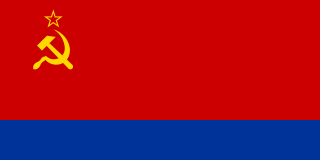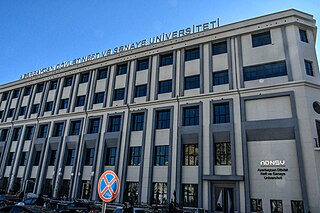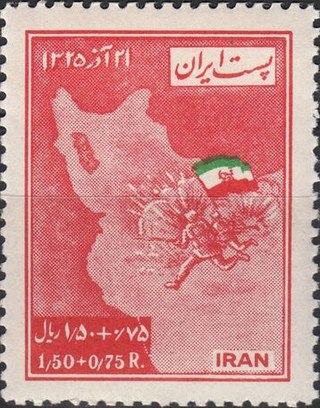
Azerbaijan, officially the Republic of Azerbaijan, is a transcontinental country at the boundary of Eastern Europe and West Asia. It is a part of the South Caucasus region and is bounded by the Caspian Sea to the east, Russia's republic of Dagestan to the north, Georgia to the northwest, Armenia and Turkey to the west, and Iran to the south. Baku is the capital and largest city.

The Azerbaijan Soviet Socialist Republic, also referred to as the Azerbaijani Soviet Socialist Republic, Azerbaijan SSR, Azerbaijani SSR, AzSSR, Soviet Azerbaijan or simply Azerbaijan, was one of the constituent republics of the Soviet Union between 1922 and 1991. Created on 28 April 1920 when the Russian Soviet Federative Socialist Republic brought pro-Soviet figures to power in the region, the first two years of the Azerbaijani SSR were as an independent country until incorporation into the Transcaucasian SFSR, along with the Armenian SSR and the Georgian SSR.

The Azerbaijan Democratic Republic, also known as the Azerbaijan People's Republic, was the first secular democratic republic in the Turkic and Muslim worlds. The ADR was founded by the Azerbaijani National Council in Tiflis on 28 May 1918 after the collapse of the Transcaucasian Democratic Federative Republic, and ceased to exist on April 28, 1920. Its established borders were with Russia to the north, the Democratic Republic of Georgia to the north-west, the Republic of Armenia to the west, and Iran to the south. It had a population of around 3 million. Ganja was the temporary capital of the Republic as Baku was under Bolshevik control. The name of "Azerbaijan" which the leading Musavat party adopted, for political reasons, was, prior to the establishment of the Azerbaijan Democratic Republic in 1918, exclusively used to identify the adjacent region of contemporary northwestern Iran.

Relations between the Grand Duchy of Moscow and the Persian Empire (Iran) officially commenced in 1521, with the Safavids in power. Past and present contact between Russia and Iran have long been complicatedly multi-faceted; often wavering between collaboration and rivalry. The two nations have a long history of geographic, economic, and socio-political interaction. Mutual relations have often been turbulent, and dormant at other times.

The Baku Khanate, was a khanate under Iranian suzerainty, which controlled the city of Baku and its surroundings from 1747 to 1806.

The National Assembly, also transliterated as Milli Mejlis, is the legislative branch of government in Azerbaijan. The unicameral National Assembly has 125 deputies: previously 100 members were elected for five-year terms in single-seat constituencies and 25 were members elected by proportional representation; as of the latest election, however, all 125 deputies are returned from single-member constituencies.

Azerbaijan State Oil and Industrial University is a tertiary education institution in Baku, Azerbaijan.

The Iran crisis of 1946, also known as the Azerbaijan Crisis in Iranian sources, was one of the first crises of the Cold War, sparked by the refusal of Joseph Stalin's Soviet Union to relinquish occupied Iranian territory despite repeated assurances. The end of World War II should have resulted in the end of the Allied joint occupation of Iran. Instead, pro-Soviet Iranians proclaimed the separatist Azerbaijan People's Government and the Kurdish separatist Republic of Mahabad. The United States pressure on the Soviet Union to withdraw is the earliest evidence of success with the new strategy of Truman Doctrine and containment.

Iran–Turkey relations are the bilateral relations between the Islamic Republic of Iran and the Republic of Turkey. The two states' relationship is complex and characterized by periods of both tension and cooperation, as both Iran and Turkey are fighting for influence in the Middle East through supporting opposing proxies as part of a proxy conflict. The two countries are also major trade partners and are perceived as mutually interdependent due to geographical proximity as well as historically shared cultural, linguistic, and ethnic traits.

Official diplomatic relations between the Republic of Azerbaijan and the Islamic Republic of Iran were established following the dissolution of the Soviet Union (1991). Iran and Azerbaijan share, to a large extent, the same history, religion, and culture. The territory of what is now called the Republic of Azerbaijan was separated from Iran in the first half of the 19th century, through the Russo-Persian Wars. In the area to the North of the river Aras, the territory of the contemporary Republic of Azerbaijan was part of Iran until it was occupied by Russia. Iran and Azerbaijan are both majority Shia Muslim nations. They have respectively the highest and second highest Shia population percentage in the world, as well as the history of Shi'ism which is rooted in both nations from exactly the same moment in history, whereas the majority of the population of both their neighboring nations are either predominantly Christians or Sunni Muslims. However, there are some tensions between the two countries as its political alignment may vary by degree. The Republic of Azerbaijan has become increasingly pro-Western aligned, and is an ally of Israel, Turkey and the United States while the Islamic Republic of Iran is largely pro-Russian and pro-Chinese aligned due to its hostility towards the U.S. and has been targeted with sanctions. Iranian politicians, like Mohammad Hosseini, have called Azerbaijan an Israeli proxy.

Azerbaijan and Israel began diplomatic relations in 1992 following Azerbaijan's independence from the Soviet Union. Azerbaijan is one of the majority Muslim countries, alongside Turkey, Egypt, Bahrain, United Arab Emirates, Jordan, Kosovo, Morocco, Albania, and the other former Soviet republics to develop bilateral, strategic and economic relations with Israel.

Russia and Azerbaijan are de facto and de jure allies in many different aspects, including military. Bilateral relations exist between the Republic of Azerbaijan and the Russian Federation. The Embassy of Azerbaijan is located in Moscow, Russia. The Embassy of Russia is located in Baku, Azerbaijan.

Trend News Agency is an Azerbaijani news agency which focuses on current affairs in the Caucasus region and Central Asia. The agency is pro-government.

The Azerbaijan State Academic Drama Theatre is an academic theatre of drama in Baku, Azerbaijan.

Bilateral relations exist between Azerbaijan and Bangladesh. Azerbaijan's ambassador to India is also accredited to Bangladesh, while Bangladesh Ambassador to Turkey is accredited as Bangladesh's ambassador to Azerbaijan. Bangladesh supported Azerbaijan in the UN with regard to the Nagorno-Karabakh dispute. Azerbaijan supported Bangladesh on its nomination to International Maritime Organization in 2011.

Azerbaijan-India relations are the bilateral relations between Azerbaijan and India.

Diplomatic relations exist between Azerbaijan and Uruguay. Neither country has a resident ambassador.

Bilateral relations exist between the Republic of Azerbaijan and the Lebanese Republic in diplomatic, socio-economic, cultural and other spheres.

Azerbaijan—Lithuania relations refers to the bilateral relations between Azerbaijan and Lithuania. Both countries were Republics of the Soviet Union and are Post-Soviet states.



















